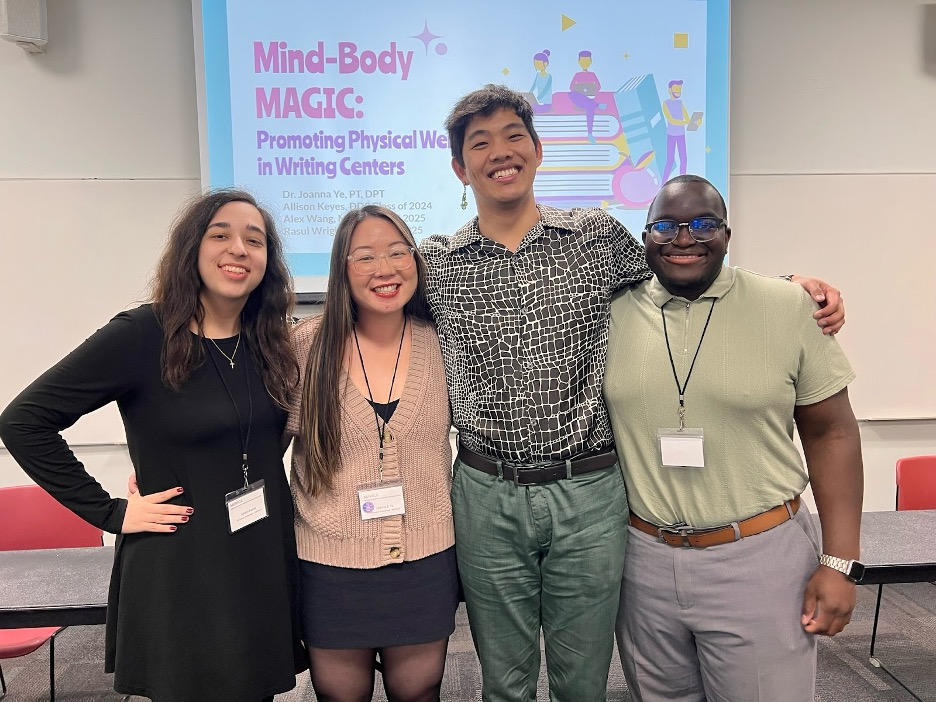Peer Writing Consultants Share Strategies for Physical Well-Being in the Writing Center
March 29, 2024 The UMB Writing Center Team
At a regional conference, four UMB peer writing consultants deliver a presentation on their physical wellness and equity initiative.
Photo: From left, Allison Keyes, Joanna Ye, Alexander Wang, and Rasul Wright at the Mid-Atlantic Writing Center Association Conference on March 23 at George Mason University.
Physical wellness isn’t usually the first thing that comes to mind when considering the work University of Maryland, Baltimore (UMB) Writing Center peer consultants do. But they see physical well-being as a key part of their practice with writers through online and in-person writing consultation.
At the Mid-Atlantic Writing Center Association (MAWCA) conference March 23 at George Mason University in Fairfax, Va., four UMB Writing Center consultants presented an interactive workshop on incorporating movement into both professional training and consultations with UMB writers. Since 1988, the MAWCA conference has brought together writing center administrators and peer consultants from the Mid-Atlantic region. This year, about 150 attendees gathered for a diverse program centered around the theme “People Power: Community and Care in the Contemporary Writing Center.”
“As a physical therapist, I am always encouraging my clients to incorporate movement and exercise into their daily routines,” said Joanna Ye, DPT, PT, a 2023 graduate of the University of Maryland School of Medicine and the current multilingual writing fellow with the UMB Writing Center. “This conference was a great opportunity to share my expertise in movement to promote physical activity and wellness in academic spaces.”
Joining Ye in her presentation were current peer graduate writing consultants Allison Keyes (School of Dentistry, Class of 2024), Alexander Wang (School of Social Work, Class of 2025), and Rasul Wright (Francis King Carey School of Law, Class of 2026). Ye started by introducing a theoretical framework for why writing center professionals would prioritize physical wellness for themselves and their teams. “Writing center work is physical work,” she says, because hours of screenwork have an effect on our bodies.
Citing emerging literature on mindfulness as wellness in the writing center (Featherstone et al., 2019; Giaimo, 2023; Johnson, 2018), Ye noted that we still don’t pay as much attention to the physical dimension of wellness in academic settings.
“The theme of this year’s conference was centered on creating communities of care,” she said. “My training in physical therapy has taught me how movement and exercise have profound benefits for not only the physical, but also the mental, emotional, and social dimensions of health. Facilitating opportunities to move and promoting physical activity during work hours is therefore an essential way to care for the well-being of our communities and to create a just and equitable learning environment.”
Each presenter spoke to what it meant to them to incorporate movement activities into their writing center professional development this year.
“As someone who leads an active lifestyle, I appreciate how the UMB Writing Center values movement within our work,” Keyes said. “The stretches that Dr. Ye taught us during our writing center trainings are easy to implement and certainly help me with ergonomics as a student-dentist during the day and a writing consultant at night.”
Wang described their writing process as instinctual and emotional, and highlighted movement activities as a unique opportunity to ground themselves in their body after spending so much time in their mind, especially being an already quite cerebral person. Wright said, “Most of the time, as a graduate student, I forget how impactful physical fitness can be whilst excelling within our respective programs. A little goes tremendously far when physical fitness is prioritized.”
James Wright, associate director of the UMB Writing Center, who attended the presentation, said, “The UMB consultants’ presentation highlights an often unacknowledged yet generative discussion increasingly important in graduate education. Attention to the ways writing center consultants and their administrative staff embody their practices in collaboration with writers emphasizes the distinct networks of care and community writing centers can encourage in response to the pressures and rigors of graduate and professional education framed within larger social and political challenges around justice and equity.”
The UMB Writing Center team grounds consultant professional development in justice and equity theory and practice.
“The consultants’ presentation this year offered original insights and practical tools for other writing center staff to add movement to their practices for well-being and equity,” said UMB writing advisor Hannah Mueller, who was also in attendance. To close their presentation, the consultants led participants in stretches and movement games and discussed how and why these interventions could be applied in different writing center contexts.
The UMB Writing Center leadership team is excited to keep incorporating physical wellness as a key element in professional development programming for consultants. The team also is considering new ways to invite clients into movement breaks during in-person and online sessions.
References:
Featherstone, J., Barrett, R., & Chandler, M. (2019). The Mindful Tutor. How We Teach Writing Tutors: A.
Giaimo, G.N. (2023). Unwell Writing Centers: Searching for Wellness in Neoliberal Educational Institutions and Beyond. University Press of Colorado.
Johnson, S. (2018). Mindful Tutors, Embodied Writers: Positioning Mindfulness Meditation as a Writing Strategy to Optimize Cognitive Load and Potentialize Writing Center Tutors’ Supportive Roles.